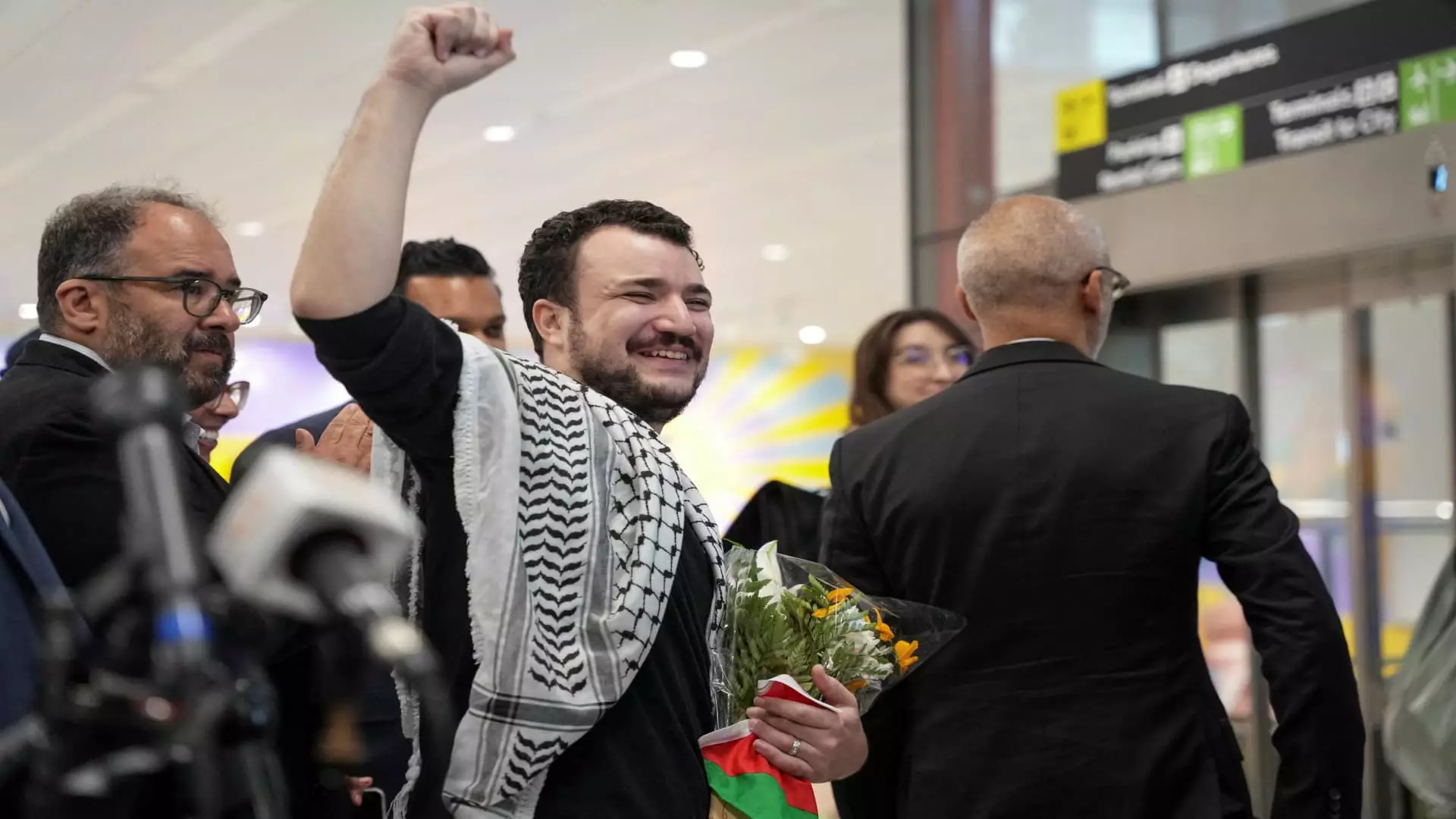The narrative surrounding Mahmoud Khalil resonates deeply not only as an individual story but as an emblem of broader systemic injustices. His return to the New York area after a staggering three-month ordeal in Immigration and Customs Enforcement (ICE) detention sheds light on the unsettling realities faced by many who dare to voice dissent, particularly in relation to issues of foreign conflict and human rights. Khalil’s fierce resolve, articulated as he emerged from the shadows of his detention, underscores the resilience of the human spirit against governmental oppression.
Arrested at Columbia University, a prestigious institution that paradoxically represents both enlightenment and institutional complicity, Khalil was whisked away to a remote detention center in Louisiana, far from the academic sanctuary he called home. His ordeal may have been a personal tragedy, but it speaks to a pressing societal concern: the weaponization of immigration laws to silence dissenting voices. Khalil’s insistence that “the genocide is still happening in Gaza” becomes a rallying cry not just for his own liberation but for all who are marginalized in the discussion about Palestine and Israel.
Political Persecution: A Wider Pattern
The implications of Khalil’s detention extend well beyond his feet touching the ground at Newark International Airport. The intersection of immigration control and political activism raises alarming questions about the limits of free speech in America. Representative Alexandria Ocasio-Cortez aptly pointed out the political motivations behind Khalil’s arrest, indicating a growing acknowledgment among some lawmakers that civil liberties are increasingly under attack in today’s sociopolitical climate.
Khalil’s case is not an isolated incident but part of a disturbing trend wherein students and academics critical of U.S. policy toward Palestine face grave repercussions. The American government’s approach to Khalil’s activism underlines a troubling narrative of control and intimidation. The continued existence of this oppression, even in the name of “national security,” reflects a state willing to sacrifice principles of justice and liberty for the sake of silencing dissent.
The Role of Media and National Discourse
Khalil’s release has ignited widespread media attention, and rightfully so, bringing to light the compelling story of a man who refused to cower in the face of adversity. This eruption of public interest is a testament to the power of collective resistance. The fact that Khalil’s unlawful detention spurred outrage highlights an imperative moral obligation among citizens to challenge the actions of their government.
However, the narrative’s construction within mainstream media is fraught with biases that often undermine the gravity of Khalil’s statements and the injustices faced by many pro-Palestine activists. The specter of “national security” has often been weaponized in the public discourse, stifling critical conversations about U.S. foreign policy and its ramifications. Khalil’s story serves as a critical reminder that the pursuit of justice and truth must not be blurred by fear or manipulated by political agendas.
An All-Encompassing Struggle
The emotional weight of the Khalil saga is further amplified by the personal impact on his family. Dr. Noor Abdalla, Khalil’s wife, gave birth to their child while he remained incarcerated, highlighting the profound human cost of such politically charged actions. The emotional turbulence faced by families like Khalil’s encapsulates the duality of academic activism—both a fight for justice and a personal battle against the machinations of government policy.
This poignant narrative invites a deeper look at the onus placed not just on individuals like Khalil but on institutions such as Columbia University. Their complicity, whether direct or indirect, in endorsing policies that contribute to the suppression of dissent must be scrutinized. The challenge is to redefine the role of educational institutions. Are they to be bastions of free thought or supporters of a status quo that often turns a blind eye to injustice?
The Future of Free Speech
As the nation reflects on Khalil’s case, the question arises: What does it mean to advocate for justice in a climate so steeped in silencing voices? Khalil’s unwavering stance, stating that “my existence is a message,” reverberates powerfully. It serves as a clarion call not just for individuals directly involved but for an entire generation to engage actively in advocacy.
As much as Khalil’s ordeal represents a stitch in the fabric of America’s complex reality, it urges citizens to engage with these narratives critically. It’s about recognizing the interconnectedness between personal stories and collective movements. Khalil is no longer just a student activist; he embodies the struggle for freedom, not just for himself but for countless others who face similar threats of erasure. This case exemplifies that the fight against political persecution is far from over, existing at the intersection of resilience and resistance amid a backdrop of institutional failure.

Leave a Reply